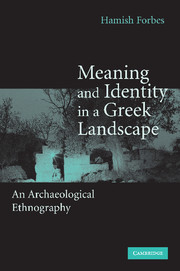Book contents
- Frontmatter
- Contents
- List of Illustrations and Tables
- Preface and Acknowledgements
- Transliteration Conventions
- 1 Introduction
- 2 Landscape Studies: From Frame-and-Tame to Visceral Feeling
- 3 Historical Background to the Landscape of Methana
- 4 Conducting Fieldwork on Methana
- 5 Kinship, Marriage and the Transmission of Names and Property
- 6 The Productive Landscape
- 7 The Historical Landscape: Memory, Monumentality and Time-Depth
- 8 The Kinship Landscape
- 9 The Religious Landscape
- 10 Conclusions: A Greek Landscape from Within
- Glossary
- Notes
- References
- Index
2 - Landscape Studies: From Frame-and-Tame to Visceral Feeling
Published online by Cambridge University Press: 04 May 2010
- Frontmatter
- Contents
- List of Illustrations and Tables
- Preface and Acknowledgements
- Transliteration Conventions
- 1 Introduction
- 2 Landscape Studies: From Frame-and-Tame to Visceral Feeling
- 3 Historical Background to the Landscape of Methana
- 4 Conducting Fieldwork on Methana
- 5 Kinship, Marriage and the Transmission of Names and Property
- 6 The Productive Landscape
- 7 The Historical Landscape: Memory, Monumentality and Time-Depth
- 8 The Kinship Landscape
- 9 The Religious Landscape
- 10 Conclusions: A Greek Landscape from Within
- Glossary
- Notes
- References
- Index
Summary
When God had finished making the world, He found a pile of stones which He had not used. Picking them up, He threw them over His shoulder. They landed in the sea and formed Methana.
(A Methana folktale)THE DEVELOPMENT OF LANDSCAPE ARCHAEOLOGY AND ANTHROPOLOGY
To a western European, Methana's landscape is spectacular. Its precipitous volcanic slopes, tamed by terraces and fruit trees or covered in verdant wild scrub which often seems to grow straight out of the barren rock, are far removed from the rolling hills of English landscape paintings or the landscapes typical of central Europe or North America. Greeks not native to Methana have described its steeply sloped mountains as disturbing looming presences, threatening to topple down onto visitors to the seaside resort there. Yet others have described Methana as ‘nothing but rocks and prickly oak bushes’. This book is about what Methanites themselves think about a landscape in which they have been born, in villages in which their grandparents were also born; where they have grown up and made a living from the land, and where they in turn have brought up families. It explores the multiple, complex meanings of a landscape to the inhabitants who have lived there and who have inherited it over the generations (fig. 2.1). This chapter provides the theoretical background to the book, starting with a history of changing archaeological approaches to landscapes before examining recent and current theories of landscape in archaeology and anthropology.
- Type
- Chapter
- Information
- Meaning and Identity in a Greek LandscapeAn Archaeological Ethnography, pp. 9 - 49Publisher: Cambridge University PressPrint publication year: 2007

